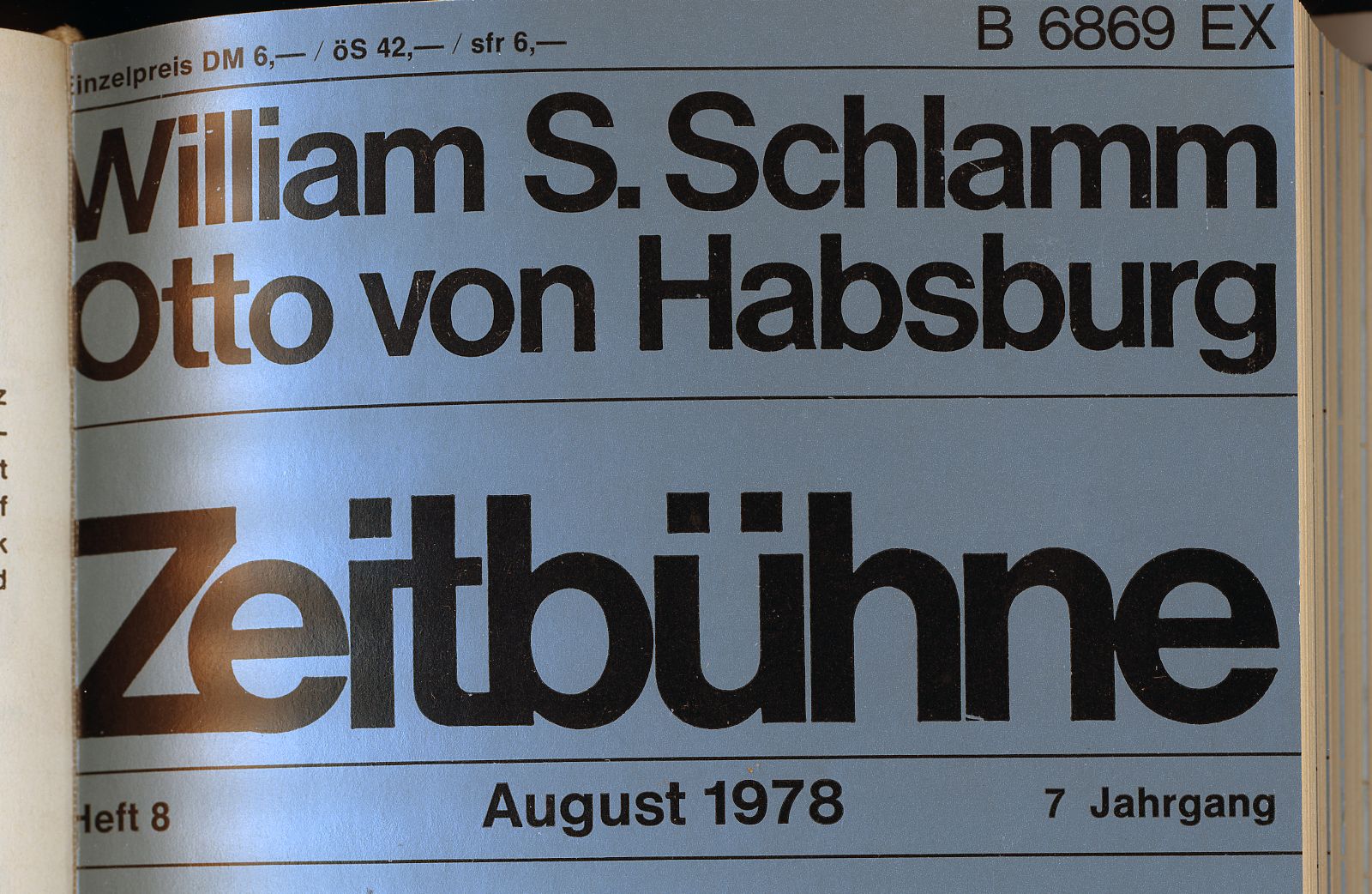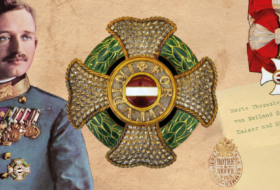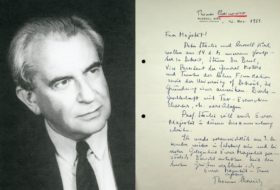In addition to participating in its founding, Otto von Habsburg contributes to almost every issue.
Further investigation into the career path of the most published authors reveals that the staff of the magazine were rather heterogeneous.
The life of the founder and editor-in-chief, William (originally Wilhelm) S. Schlamm (1904-1978) resembles a screenplay. A young man from Galicia studying in Vienna, he committed himself to the communist idea rather early. At the age of sixteen, as a member of a delegation, he meets Lenin himself in the Kremlin. During his university years his innate talent for journalism takes him to the editorial office of Die Rote Fahne (The Red Flag). He then becomes an anti-communist before the Stalinist lawsuits begin and emigrates to the United States to flee the Nazis. He works for reputable magazines (Time, Life, Fortune) and quickly finds his way into post-war conservative circles. According to one version, he persuades William F. Buckley to establish the National Review (1955). A few years later we find the restless Schlamm in Switzerland, as an editor again again but with enough energy to work for Stern and Die Welt as well. This is how Zeitbühne is founded in 1972. The journal immediately becomes a prestigious organ of German-speaking conservative thinking. Until his death, Schlamm writes an editorial preface and countless short articles in each issue.
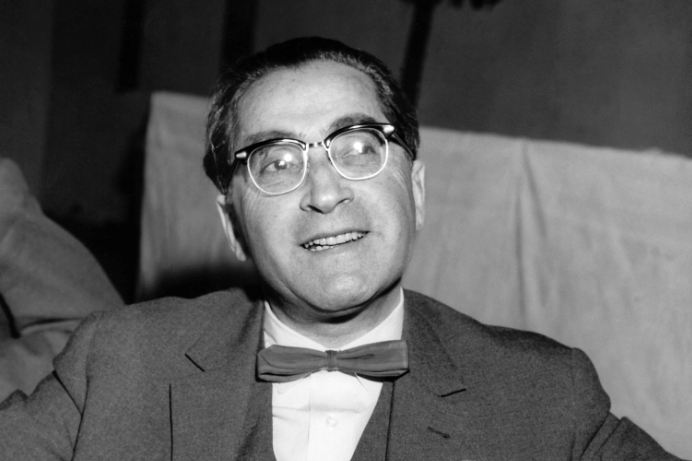
William S. Schlamm
Others also experienced the years of the First World War far from Europe. Born in Vienna, Thomas Chaimowicz (1924-) was the first Jewish student at the Jesuit University in the Colombian capital. After returning home, he gains a doctorate at the University of Salzburg, and becomes a renowned Burke expert. He also befriends Otto von Habsburg and becomes a teacher of his two children. Erik von Kuehnelt-Leddihn (1909-1999) comes from an ancient Austrian family. A convinced legitimist in Austria in the thirties, he holds a degree in economics from Budapest, and makes several visits to the Soviet Union as a journalist. During the First World War he also lives in the United States. Returning to Tyrol, he writes many political-ideological works and publishes regularly in the National Review.
The colleagues came, naturally, from very different backgrounds. Some from the media landscape of National Socialist Germany (such as Hans Georg von Studnitz or Winfried Martini). Others, such as Gerd-Klaus Kaltenbrunner (1939-2011), the Austrian writer and philosopher, or the German journalist Bruno Bandulet (1942-) a foreign policy expert, were not exposed to such ideological experiments, due to their age. It is true, however, that age is not a guarantee of everything. Hans-Dietrich Sander (1928-2017), filtering through a brief detour in East Germany, rushed over to the right. Thomas Molnar (1921-2010) a philosopher living in the USA whom we Hungarians are proud of, can be found among the authors.
A few names from over a hundred, to arouse your interest. By arranging this collection, we would like to make this valuable document of the times available for further reasearch. Through the Zeitbühne‘s announcements and news coverage, its publications and the organizations related to it, the network of contacts between German conservatives in Western Europe can be mapped, and new insights gained into the politics of the seventies.
|
Index The Zeitbühne was monthly issued from spring 1972 to the end of 1979, edited by founder and publisher, William S. Schlamm until his death in September 1978. During its eight years of existence, the Zeitbühne published 90 booklets of around 60 pages each. By the fall of 1974, its circulation reached 45,000 copies. A Zeitbühne consisted of short, 3-8-line articles, followed by a series of even shorter pieces, called Miniaturen, Notizen or Zwischenrufe, depending on the period of the magazine. Initially, the title name on the cover was simply that of the editor. But in December 1976, readers discovered the following statement on an inside page: “Otto von Habsburg hat sich auf meine Bitte entschlossen, ab 1. Januar 1977 mit mir gemeinsam die ’Zeitbühne’ herauszugeben. William S. Schlamm”. (“Otto von Habsburg has decided, at my request, to publish the paper jointly with me from 1 January 1977.”) From that issue on, to December 1978, both names appeared on the cover. During 1979, the final year of publication, the following words appeared: “begründet von William S. Schlamm” (founded by William S. Schlamm). The intellectual mastermind of the magazine, as can be inferred from the incomplete material in our collection, composes the editorials in each issue. He also wrote the texts of the aforementioned Miniatures until May 1978. After his death, for over half a year from November 1978, the paper begins with a prologue by Otto von Habsburg. Subsequently, on a more or less regular basis, the heading Von Monat zu Monat (From Month to Month) becomes a permanent introduction. A thematic compilation was rarely published by the Zeitbühne. Rare exceptions were the United States’ 200th birthday (1976/7), the Bolshevik takeover (1977/10), the 60th anniversary of the founding of the Republic of Austria (1978/8), and the European elections (1979/5). Issues also focused on the most pressing international themes of the seventies (Terrorism, nuclear weapons and the rule of law, 1978/4). The story of the Zeitbühne ends with the November-December 1979 issue. Schlamm was not succeeded by an editor with the same abilities, and Otto von Habsburg continued his work on a different stage of the era, in the European Parliament. |
Ferenc Vasbányai
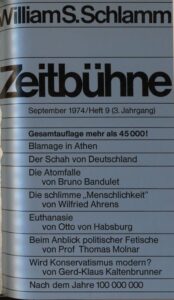 |
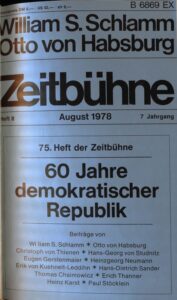 |
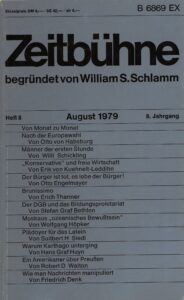 |
List of Otto von Habsburg’s writings in the Zeitbühne issues (1973-1979) from our collection
